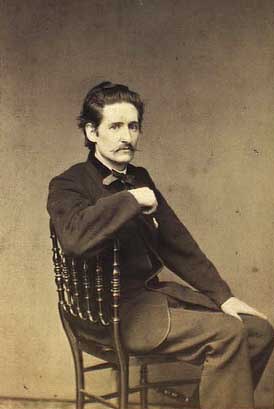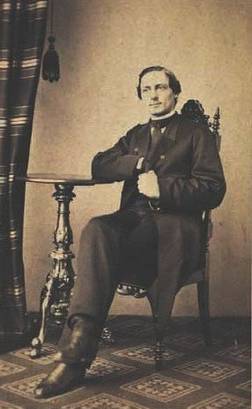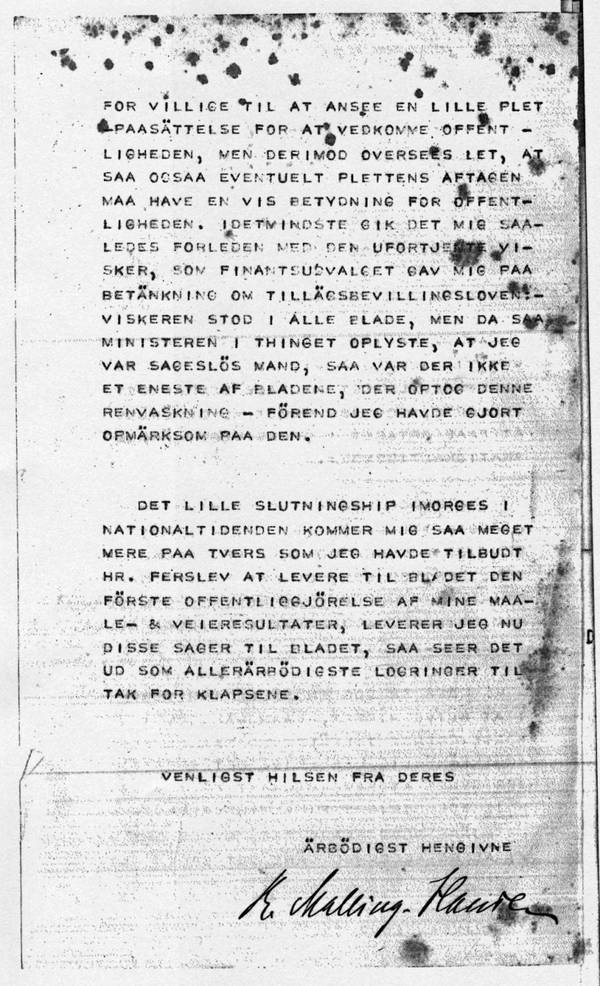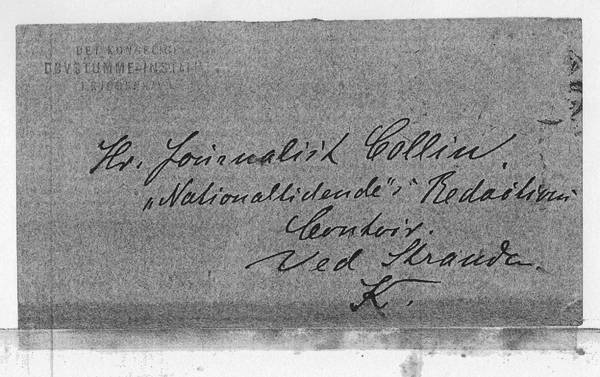1883.03.11 English
COPENHAGEN MARCH 11, 1883
DEAR EDITOR C O L L I N .
BY MEANS OF THIS VEHICLE OF COMMUNICATION[1] - NO LONGER UNUSUAL – I TAKE THE LIBERTY TO REQUEST YOU TO BE KIND ENOUGH TO CONSIDER THE ENCLOSED, WHICH I WOULD BE VERY HAPPY TO HAVE ACCEPTED FOR PUBLICATION BY YOUR DISTINGUISHED PAPER “NATIONALTIDENDE”.
QUITE POSSIBLY I REALLY OUGHT TO HAVE ADDRESSED THIS LETTER DIRECTLY TO YOUR EDITOR-IN-CHIEF, BUT, ALAS, I AM NOT ACQUAINTED WITH THE EDITOR, WHEREAS I KNOW YOU, AND CONSEQUENTLY IT IS TEMPTING TO BURDEN YOU WITH THIS MATTER – EVEN MORE SO SINCE I HAVE ONE OR TWO SIDE-REMARKS TO LET OFF MY CHEST.
IT IS INDEED SOMEWHAT ANNOYING TO BE THE TARGET OF CRITICISM, WHEN – AS IN THIS CASE – ONE IS UTTERLY WITHOUT GUILT. THE ONLY FAULT I HAVE COMMITTED WAS TO WRITE: “THE FINANCE COMMITTEE OF THE HIGH[2] PARLIAMENT”. – HOWEVER, THE DEAR MEMBERS OF THE PRESS ARE – (IF I MAY SAY SO VERY HUMBLY ) – ONLY FAR TOO EAGER AND READY TO POUNCE ON A SMALL STAIN AND MAKE IT PUBLIC. BUT, ON THE OTHER HAND, WHEN A MISTAKE IS CORRECTED AND IT WOULD BE IN THE INTEREST OF THE PUBLIC TO MAKE THIS KNOWN, THE CORRECTION IS CONVENIENTLY IGNORED. AT LEAST THIS WAS THE CASE CONCERNING THE UNDESERVED REPRIMAND I GOT FROM THE FINANCE COMMITTEE IN THEIR REPORT ON THE SUPPLEMENTARY ESTIMATES: THE REPRIMAND WAS QUOTED IN ALL NEWSPAPERS, BUT WHEN THE MINISTER, SPEAKING IN PARLIAMENT, SAID THAT I WAS NOT TO BLAME NOT EVEN A SINGLE PAPER INSERTED THIS WHITE-WASHING - AT LEAST NOT UNTIL I HAD DRAWN THEIR ATTENTION TO IT.
THE SMALL AND FINAL CRITICAL REMARK THIS MORNING IN “NATIONALTIDENDE” IS EVEN MORE ANNOYING CONSIDERING THAT I HAD OFFERED MR FERSLEV TO SUPPLY THE PAPER WITH THE VERY FIRST PUBLICATION ON THE RESULTS OF MY WEIGHING AND MEASURING WORK. IF I HAND OVER THE DOCUMENTATION TO THE PAPER AT THIS POINT IN TIME, IT WILL APPEAR LIKE A DOG WAGGING ITS TAIL MOST HUMBLY IN GRATEFUL RESPONSE TO THE SPANKING.
VERY SINCERELY,
YOUR DEEPLY DEVOTED
R. Malling-Hansen (signed by hand)
Edgar Collin (1836-1906), a journalist, theatrical historian and translator. He was also known for his friendship with H.C. Andersen. Andersen was a very close friend of the Collin family and regarded their home as his “second home”. During the 1880s Malling-Hansen corresponded extensively with Edgar Collin.
From Wikipedia: Jean Christian Ferslew, Danish industrialist and newspaper publisher, born on March 3rd 1836 in Copenhagen, died there on the 6th of July 1910. After his father passed away in 1857 he took over a lithographic establishment, founded by his father and by H.J.Bing. Already a year before that he had introduced the lithographic power press, the first of its kind in Denmark. With this establishment he combined a bookbinding department and – from 1863 – a printing house out of which, was to be published a string of daily newspapers such as “Dagstelegrafen” from 1864, “Aftenposten” from 1873 and “Nationaltidende” from 1876. In order to serve the quickly growing newspaper emporium he established a mechanical workshop and type foundry, adding from 1880 a paper mill and from 1890 a wood pulp factory (the Kattinge works by Roskilde). In addition, in 1873 he introduced the folding and stitching machine in Denmark, in 1875 the “uninterrupted printing press” and in 1879 the Kastenbein type-setting machine. In 1876 he bought the former Royal Hotel and arranged it for his publication operations, which from 1891 included the dailies “Dagens Nyheder” and “Dagbladet”, while publication of “Dagstelegrafen” ceased.
[1] i.e. by means of a letter typed on the writing ball
[2] JMC: This is complicated to translate and to understand. In 19th century Danish the adjectives ‘high’ or ‘exalted’ could in some cases be used when formulating a very formal and respectful address to a group or a person holding high office. In English usage, we would not use the expression ‘high’ , but in this case it is kept as an element (RMH’s mistake) , without which the letter would not make any sense (incidentally, it is not clear to me in what way RMH faulted; presumably he missed to follow some minor formal rule of address in use at the time, but since he was exonerated by the minister, it cannot have been a grave mistake).

- Journalist end editor Edgar Collin, 1836-1906. Photo: The Royal Library

- Jean Christian Ferslew, 1836-1910. Photo: The Royal Library



